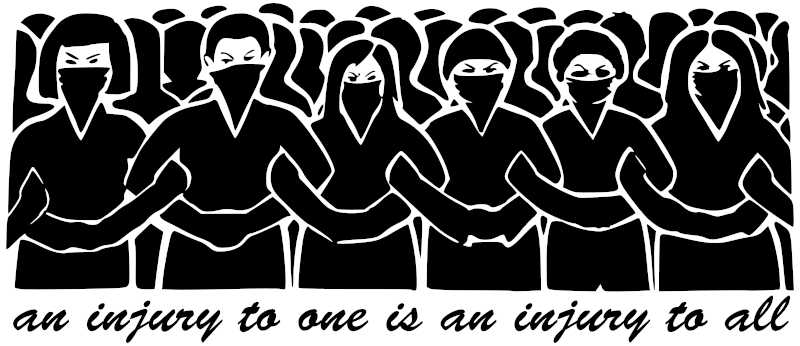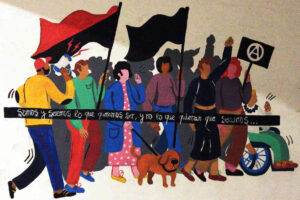
Image borrowed from @BrothersCreativ – https://twitter.com/BrothersCreativ/status/1116294026834120709
What does the class war have to do with oppression?
Some people on the Left think class is the only thing that matters. Never mind that it is mostly working class people who face this stuff. All that will, apparently, fix itself as soon as we deal with the problems of class. They want to reduce everything down to the lowest common issue and only deal with the problems that affect every working class person. So they are called “class reductionists”. [6]

I like the ideas of the IWA-AIT, but come on! We can do better than a logo showing a lone white man to represent the global working class
If we are going to build an international working class movement, it has to be a movement that deals with all the different problems that working class people face, and puts those problems right at the front of our struggle. To do anything else is no different than cutting off our nose to spite our face! People aren’t going to wait for their freedom and they won’t join a movement that ignores some of their biggest problems. The same goes for if we try to include bigots in our movement. If we don’t challenge hateful attitudes from people in our own class, that will end up excluding far more people who are turned away by the bigotry, than the number who stay because we go easy on bigots. Some people genuinely want to learn and just need things explaining to them. But after that, continuing to be a bigot is a choice, just like being a member of the owning class is a choice, and we shouldn’t have to tolerate that. An injury to one is an injury to all.
That’s class reductionism. Some people go too far in the other direction. They accept that all of these kinds of oppression are important, but package them up into neat little separate boxes on their own. And so we have groups for working class people that only focus on class, groups for black people that only focus on racism, and groups for women that only focus on misogyny, and so on. This is not enough! And there are three reasons for that.
First, a lot of discrimination happens in the workplace or community – the two places we are already organising as a class. When black people are last hired and first fired, that is a workplace issue and you should be able to go to your union for solidarity. The same goes for when women are sexually harassed by their boss. The Solidarity Federation have produced a version of their workplace organiser training for just that purpose – combating misogyny at work. Page 43 of The Trouble Makers’ Handbook 2 also has some excellent examples of fighting discrimination in the workplace. That’s work, but the same goes for our neighborhoods. When people face harassment walking down our streets just for being who they are, there should be a whole-community response. When police in our neighbourhoods stop and search or even murder black youth, shouldn’t we all stand up to them and drive them out? We’re not there yet, but it’s something to aim for.
The second problem is that oppressions happen together. For example there are things black working class women experience that are neither shared by black men, nor by white women, nor by other working class people. [9] To break us up into neat little boxes, all too often reduces oppression within that group to the lowest common issue – just like class reductionists do with working class experience.
The last problem with separating the different kinds of oppression, is it misses an opportunity. We are stronger together. For example, transgender people make up less than a percent of the population. [10] As part of the LGBTQIA+ movement, we are significantly better off. Every letter we add makes us stronger! Bringing all kinds of oppression together puts us squarely in the majority. If we limit ourselves to organising just one identity, then we also limit our strength and cut ourselves off from each other, hiding our shared interests. Since most people in the world are working class, our shared exploitation is an opportunity to fight under one banner. Not ignoring other kinds of oppression, but making them part of the struggle as well.
Just to be clear, people DO need to organise against their own oppression too. We need safe spaces where we talk together and make sense of our experiences. Sometimes as a group within working class organisations, like the LGBT committees within trade unions. Sometimes independently, like the independent Disabled People’s Organisations. When we have BOTH, it’s possible to keep each other in check. Working class organising gives access to solidarity from all the class and stops owning class people from taking over everything. Independent organising holds class-based organisations to account and gives people a place to go for help when there is a problem inside their unions. [11]
Class Unity: the way forwards
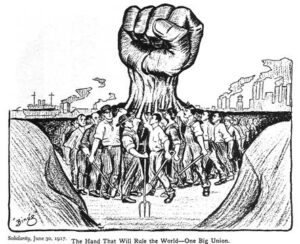 So, class unity is the way forward. Neither class reductionist, nor missing the opportunity to use class struggle to unite people against all oppression. Class unity works because at the end of the day it is in our material interest to free ALL of our class, rather than fight amongst ourselves for scraps the owning class throw us. Which is exactly what will happen if we don’t include every kind of oppression working class people face in our fight. But class unity doesn’t happen by itself. It has to be built. It’s the most natural thing in the world once it gets going – like cutting wood along the grain. But it still needs a spark to get started, still needs people to stand up against bigotry and put class unity against the rich and powerful in its place.
So, class unity is the way forward. Neither class reductionist, nor missing the opportunity to use class struggle to unite people against all oppression. Class unity works because at the end of the day it is in our material interest to free ALL of our class, rather than fight amongst ourselves for scraps the owning class throw us. Which is exactly what will happen if we don’t include every kind of oppression working class people face in our fight. But class unity doesn’t happen by itself. It has to be built. It’s the most natural thing in the world once it gets going – like cutting wood along the grain. But it still needs a spark to get started, still needs people to stand up against bigotry and put class unity against the rich and powerful in its place.
Shamefully, the workers’ movement has NOT always been a place that all working class people could go for solidarity. Sometimes our unions even joined the bosses in enforcing racial discrimination, as in the case of Bristol buses (which was discussed in the previous article) It was only after a boycott from the Black community that Black people were allowed to work as bus drivers in Bristol. This wasn’t just a problem with individual unions either. Since 1892 and for years after, the whole Trade Union Congress campaigned against migration from working class people in other countries. [12]
Things still have a long way to go, but there has been progress! For example, women used to be under-represented in trade unions but there are now more women than men. This has come about through years and years of hard work, most of it by oppressed groups themselves. Once again: class unity is something that has to be built.
I’m not the first person to say this, and it isn’t a new idea. As the Asian workers’ strike committee from the Imperial Typewriters’ dispute stated in 1974: [13]
Right now the trade union movement in Britain is functioning as a white man’s union and this must be challenged. In challenging this we believe in the unity of the working class. This unity must be solidly established in deed and not only in words. It is the main task of the trade-union movement to create this unity.
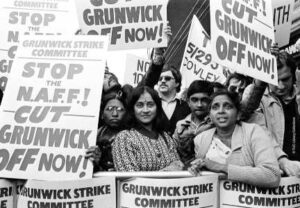 We’ll look at three examples that changed the situation and helped open the workers’ movement up to ALL working class people. Let’s start with the Grunwick dispute. This was a strike in 1976 at a photo film processing factory in Grunwick, London. The majority of the strikers were South Asian women. For years strikes like this had been ignored by the trade union movement due to racism at the top, but this time something was different. Strike organisers worked tirelessly to speak to the trade union members themselves, often over the heads of bureaucrats who were dragging their feet. As a result they were able to hold mass pickets of hundreds of people, one with 20,000 outside the factory gates! Young white men from the coal fields up North bussed down to London to support South Asian women. Nothing like this had been seen in the UK before! Postal workers risked their own jobs in support, refusing to deliver post to the factory.
We’ll look at three examples that changed the situation and helped open the workers’ movement up to ALL working class people. Let’s start with the Grunwick dispute. This was a strike in 1976 at a photo film processing factory in Grunwick, London. The majority of the strikers were South Asian women. For years strikes like this had been ignored by the trade union movement due to racism at the top, but this time something was different. Strike organisers worked tirelessly to speak to the trade union members themselves, often over the heads of bureaucrats who were dragging their feet. As a result they were able to hold mass pickets of hundreds of people, one with 20,000 outside the factory gates! Young white men from the coal fields up North bussed down to London to support South Asian women. Nothing like this had been seen in the UK before! Postal workers risked their own jobs in support, refusing to deliver post to the factory.
Trade union leaders sabotaged the dispute and it was lost (though things did get better for some of the workers). The union officers felt threatened by the show of solidarity from below, as did their friends in the Labour Party. Even so, the solidarity shown during the strike changed the workers’ movement in the UK forever. It encouraged the movement to openly oppose racism, and to start supporting non-white workers. There is still a long way to go, but the bravery of those strike organisers in reaching out, showed how the walls of racism can be broken down by working class solidarity. So long as we are prepared to fight for it. [14] [15]
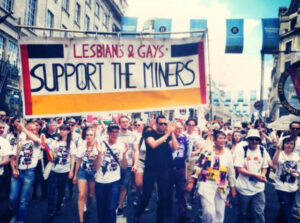 The next example is of solidarity going in the other direction. If you’ve seen the film Pride you’ll know about Lesbians and Gays Support the Miners – a group who supported striking miners during that bitter dispute in the 1980s. LGSM didn’t have to reach out to the miners – they were mostly from the cities and had their own problems to deal with. But they did, and the miners never forgot it. On June 29th 1985, London’s Gay Pride march was led by Welsh miners in a show of solidarity for LGSM’s support during the strike. The miners’ union (NUM) supported lesbian and gay rights after that, and their influence was important in bringing down Section 28, a law that banned any discussion of lesbian and gay people in schools, leaving millions of young lgbtqia+ people isolated and alone. Working class solidarity helped change that.
The next example is of solidarity going in the other direction. If you’ve seen the film Pride you’ll know about Lesbians and Gays Support the Miners – a group who supported striking miners during that bitter dispute in the 1980s. LGSM didn’t have to reach out to the miners – they were mostly from the cities and had their own problems to deal with. But they did, and the miners never forgot it. On June 29th 1985, London’s Gay Pride march was led by Welsh miners in a show of solidarity for LGSM’s support during the strike. The miners’ union (NUM) supported lesbian and gay rights after that, and their influence was important in bringing down Section 28, a law that banned any discussion of lesbian and gay people in schools, leaving millions of young lgbtqia+ people isolated and alone. Working class solidarity helped change that.
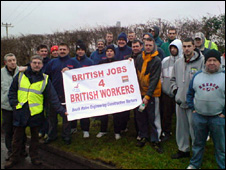 Now for the last example. In 2009 a strike wave hit the energy industry. Workers at Lindsey Oil Refinery started it all, with a wildcat strike against a plan to undermine their terms and conditions. Solidarity actions (which are illegal) then spread all over the UK. The Labour Party at the time had been promoting the racist slogan “British jobs for British workers”, an idea started by the fascist British National Party. At the start of the Lindsey dispute, some workers had taken up that slogan as well and displayed it on picket lines. That changed as the dispute went on. Most of all when hundreds of Polish workers at Langage power station in Plymouth walked out in solidarity with them! They could hardly keep holding those placards after that – and so far as we know there hasn’t been anything like it from the trade union movement since. People came to realise that working class solidarity, not national or racial solidarity, is where their interests really lie. It took courage for those Polish workers to step out and join the strikes, but their actions helped change the direction of the dispute, as well as protecting their own pay and conditions. [16]
Now for the last example. In 2009 a strike wave hit the energy industry. Workers at Lindsey Oil Refinery started it all, with a wildcat strike against a plan to undermine their terms and conditions. Solidarity actions (which are illegal) then spread all over the UK. The Labour Party at the time had been promoting the racist slogan “British jobs for British workers”, an idea started by the fascist British National Party. At the start of the Lindsey dispute, some workers had taken up that slogan as well and displayed it on picket lines. That changed as the dispute went on. Most of all when hundreds of Polish workers at Langage power station in Plymouth walked out in solidarity with them! They could hardly keep holding those placards after that – and so far as we know there hasn’t been anything like it from the trade union movement since. People came to realise that working class solidarity, not national or racial solidarity, is where their interests really lie. It took courage for those Polish workers to step out and join the strikes, but their actions helped change the direction of the dispute, as well as protecting their own pay and conditions. [16]
In all of these examples, class unity grew because oppressed people reached out. Their hard work paid off, and both built up the class struggle AND the fight against their own oppression. It doesn’t always happen in big “breakthrough moments” like the ones described above. It might be a lot of small struggles and a lot of hard, invisible work over a long time. But either way, the key is to create a sense of shared struggle. Alone and divided, working class people are weak. But when we stand together the rich and powerful can’t stop us. The workers’ movement is based on that, so there is always a tendency to class unity if we stoke the flames. The bureaucrats will try to keep that under their control – so appeal directly to the rank and file if you can. That’s where our real power lies. Even with mass-agreement, you’ll still have to work to push the leadership to put their own policies into action. Keep fighting and don’t take no for an answer!
Why is Class Unity hard work?
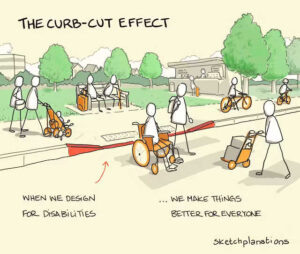
image from: https://sketchplanations.com/the-curb-cut-effect
All this begs the question: Why does it take struggle and work to build class unity? Why wasn’t it at the heart of our movement from the start? Why do working class people with these relative benefits still uphold oppression, when their benefits are small compared to what a united working class could get? Is it just because they don’t think change is possible, and they are trying to make the best of things as they are? That’s part of the story, for example across Europe we’ve seen growing nationalism when left-wing movements failed to stop austerity. Foolish and cowardly as it is, many people genuinely believe that national unity, teaming up with the owning class in their own country, has more to offer them than fighting for their class. But that’s not the whole story either. WEB Du Bois found an answer for the time he was looking at not only in economics but also in psychology. He said: [18]
“It must be remembered that the white group of laborers, while they received a low wage, were compensated in part by a sort of public and psychological wage. They were given public deference and titles of courtesy because they were white. They were admitted freely with all classes of white people to public functions, public parks, and the best schools. […] The newspapers specialized on news that flattered the poor whites and almost utterly ignored the Negro except in crime and ridicule”
In other words, these systems of oppression are strong because they get people to identify with them and enforce them, even if they are hurting themselves in the process. They have a powerful psychological hold over people with relative advantage. WEB Du Bois was talking about racism, but we see the same kind of thing in misogyny – a man may be exploited all day, but in his home he is still top dog. [19] Machismo leaves him thinking “at least I’m a real man and I can be proud of that. I’m a decent and upstanding person, unlike those degenerates!” and other such nonsense. Ableism leaves people finding personal pride in capacities they have through the accident of birth, all of which could be taken away at any time. They feel disgust at the people society has marked “disabled” out of fear they might one day become them. And so no matter what the material reality is, the owning class has cut us off from any kind of solidarity with each other across the lines of oppression. None of this is written to diminish the hurt caused by working class people oppressing and exploiting other people who they have power over. The point is to stop it, and talking about it like this is the best way to do that.
If we are serious about fighting the class war, we need to let go of all these attitudes and prejudices inside of us. We need to find pride in our identity as workers and our history of working class struggle, not in petty advantages – scraps thrown from the tables of the rich and powerful. As we’ve already seen, common struggle helps to build up working class identity. As well as common struggle, we also need to work on ourselves. When we organise together, part of that should involve helping each other to become better people. The workers’ movement has a proud tradition of self-education – let’s make use of it!
There have been good steps towards self-education against oppression within the workers’ movement. Recently UCU, a union for university staff, adopted a programme of education around disability. [20] Another development is support for transgender rights. The Trades Union Congress and also Unison, which is the biggest trade union in the UK, voted to support transgender people and condemn transphobia. They’ve now launched a network to promote the rights of trans and non-binary workers. [21] This means a lot at a time when the tide is turning against transgender people in the UK. Both of these changes came from the tireless work of working class disabled and transgender activists.
Take responsibility for challenging individual bigots, particularly when it’s about something that doesn’t affect you. Never run from a fight unless you have to! That could be as simple as taking someone aside and explaining what they’ve got wrong. Sometimes that’s all it takes. Other times, with serious bigots and abusers, more action is needed. The worst of them will try to trap you and get a reaction, so fight smart. They may act all sweetness and light in a group, only showing their true face to those they trust or those they want to hurt. Build informal alliances with other people who can help kick them out. Get evidence together to show what they are really like. [22]
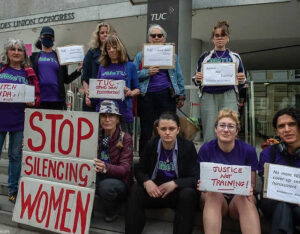 Formal processes, like a “safer spaces policy” or “grievance procedure” are useful for setting expectations. But they can also be a double-edged sword, turned against those they are meant to protect. Beware of relying on formal rules to enforce themselves. For example the MeTU movement – women in trade unions fighting against the sexism and harassment they’ve faced from their own colleagues – started when women who’ve been failed by the procedures of their own unions, began to speak out on their own terms. Courage is more important than rules and regulations! [23]
Formal processes, like a “safer spaces policy” or “grievance procedure” are useful for setting expectations. But they can also be a double-edged sword, turned against those they are meant to protect. Beware of relying on formal rules to enforce themselves. For example the MeTU movement – women in trade unions fighting against the sexism and harassment they’ve faced from their own colleagues – started when women who’ve been failed by the procedures of their own unions, began to speak out on their own terms. Courage is more important than rules and regulations! [23]
Class unity helps to undermine bigotry and systematic oppression. Once again, as much as class unity can help, it doesn’t happen all by itself. We need to work for it. When we do this, it changes the attitudes of other working class people and brings them into our fight. In asking for help from other workers, we are not asking for charity, for a hand out. All we are asking is for them to act in their own interests, to do what’s needed to beat the owning class. We are stronger together, never forget that.
This article is part of a series on the class struggle. The previous article was WORKING CLASS DIRECT ACTION. I’ll be taking a short break from writing this series for a month or two. But then I’ll be back with one on CLASS AND THE STATE. See you then!
Footnotes:
[1] – https://www.tuc.org.uk/research-analysis/reports/jobs-and-recovery-monitor-gender-and-pay
[3] – https://www.tuc.org.uk/research-analysis/reports/still-rigged-racism-uk-labour-market
[4] – Even when no money or wages is involved, anything involving division of labour, or who gets what goods and services, is by definition both economic and social. The idea that class is economic, whilst everything else is merely “social oppression”, is misguided
[5] – For example, this article analyses class and ADHD. And that’s just one disability, rather than ableism in general! http://solfed.org.uk/plymouth/adhd-capitalism-and-disability-activism
[6] – Note that in this section I’ll be exploring the issues by taking two tendencies to their extreme, in order to make a point. But just to be clear, it’s actually not all that common to see people saying anything like this, and certainly not out loud. What you are more likely to see, for example, is not folk saying “only class matters” but rather organisations made up of mostly white working class men, focusing mostly on those issues that include white working class men, with issues affecting other oppressed people given less priority and those people themselves having less say in the organisation. (All too often, women are pushed into the role of taking the minutes and making the tea, rather than taking initiative or leadership.) In the wild, you’re more likely to see class reductionism in ACTIONS, than in words and theory. The same goes for people who put all oppressions in their little box and ignore intersectionality. The people doing that may even claim to be intersectional! To see it, you have to watch for deeds not words.
[7] – https://www.humanity-inclusion.org.uk/en/action/disability-the-global-picture
[8] – https://diversityuk.org/diversity-in-the-uk/
[9] – The idea that oppressions can’t be dealt with in isolation is called intersectionality, a term which came out of the Black Feminist movement in the US, partly because of this problem that neither black power nor feminist groups alone were enough. The term was invented by black feminist and legal scholar Kimberlé Crenshaw in 1989: https://chicagounbound.uchicago.edu/cgi/viewcontent.cgi?article=1052&context=uclf. Some of the ideas in that work came from earlier on, directly from the movement, for example in the Combahee River Collective Statement: https://web.archive.org/web/20170224021117/http://circuitous.org/scraps/combahee.html. It’s common for groups that ignore intersectionality to get taken over by middle class people and then co-opted into irrelevance – just look at most pride parades today! Pride used to be a protest for people’s rights, now half of them are little more than a corporate fair for self-promotion (and you still have to pay to get in!) Related to this point, there’s something worth clarifying: all systems of oppression are fundamentally different. It’s not possible to create one great “theory of oppression” or privilege and simply fill in the blanks for each case. It’s more messy than that. Intersectionality doesn’t just mean “all oppressions matter” or that “all oppression is the same”. It’s about how different kinds of oppression combine to make something bigger and more complex than any one oppression alone
[11] – Does this sound like a lot of work? Yes. And it’s going to fall to people who had the least spare time to begin with. So we have to make sure all our groups are sustainable and not going at 100% all of the time. Unless we set a reasonable pace of work, it will be difficult just to keep up activity in ONE organisation, let alone several.
[12] – For example, they supported the antisemitic Aliens Act in 1905, which helped to divide our class against each other.
[13] – quoted from: Amrit Wilson, Finding a Voice: Asian Women in Britain, p83-84
[14] – see the documentary The Great Grunwick Strike, to hear from some of the workers in their own words what happened and why. Also check out the Working Class History podcast on the strike https://workingclasshistory.com/podcast/grunwick-strike-1976/
[15] – the strike was also an extremely important moment for the Asian women workers THEMSELVES. For more on that, see chapter 5 of Finding a Voice: Asian Women in Britain. “That strike has proved for always that Asian women workers can be strong, resourceful and courageous, that they can stand up, face the world and demand their rights”
[16] – see these two articles on libcom for an analysis of the strike – https://libcom.org/article/hundreds-polish-workers-join-wildcat-strikes; https://libcom.org/article/2009-strike-lindsey-refinery-struggle-entangled-nationalism. There are also several others on the site – https://libcom.org/tags/lindsey-strikes-2009
[17] – here are just a couple of the incidents that have been reported in the press: https://inews.co.uk/news/uk/butch-lesbian-public-toilet-women-abuse-government-review-gender-neutral-facilities-833787; https://www.devonlive.com/news/devon-news/exeter-woman-close-tears-after-7099881
[18] – this quote, from Black Reconstruction in America, is included in order to give credit to WEB Du Bois for his role developing and inspiring this line of thinking. However, we need to be clear that how to interpret it is controversial – it has certainly been misconstrued and oversimplified by some who would use it to justify their own ideas. In particular the “wages of whiteness” is not a phrase that Du Bois used himself, but it has become associated with him in a way he may or may not have approved of! I’d urge readers to also read his Black Reconstruction in America for yourselves, rather than relying on this or that interpretation or extract.
[19] – As Lucía Sánchez, co-founder of the Spanish feminist and anarcha-syndicalist Mujeres Libres put it: “The lowliest slave, once he steps across his threshold, becomes lord and master. His merest whim becomes a binding order for the women in his household. He who, just ten minutes earlier, had to swallow the bitter pill of bourgeois humiliation, looms like a tyrant and makes these unhappy creatures swallow the bitter pill of their supposed inferiority.”
[22] – Just to clarify, you shouldn’t need “evidence”, and there ARE people who will believe you at your word! Most abuse doesn’t leave obvious “proof” behind and it’s a ridiculous thing to demand of survivors. Their word is proof. Nevertheless some people do demand it, and refuse to believe their buddies capable of hurting the smallest fly until proven otherwise. That’s why I suggested it here – if you can get evidence (save the messages the sent you, etc) then that is going to make your life easier even though you should absolutely never have to do that. The most important thing is getting yourself out, and keeping yourself safe. ALWAYS put that first, don’t delay in the hopes that you;ll be able to prove things to other people.
[23] – The kind of courage we are talking about is not a personality trait, it’s collective. It’s a gift that we give to each other when we listen, when we believe, when we choose to stand shoulder to shoulder.
